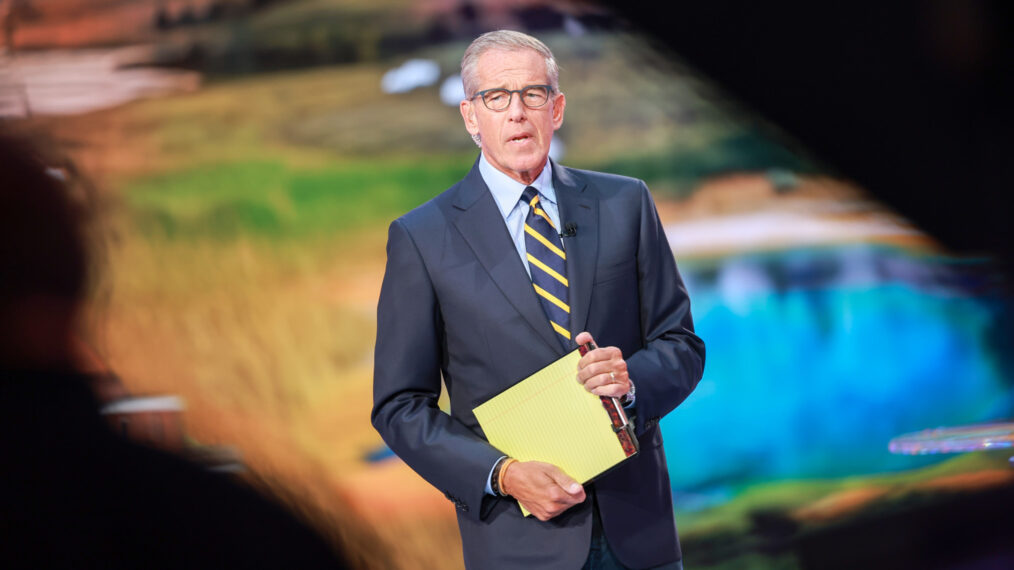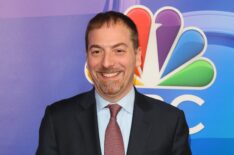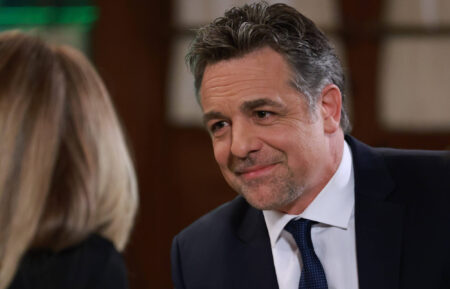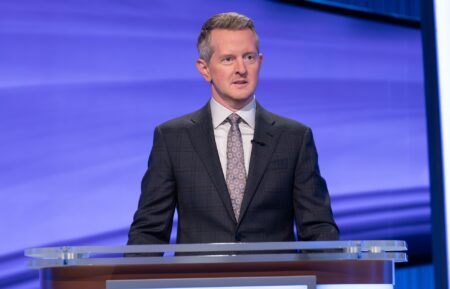The 2015 Controversy That Ended Brian Williams’ ‘Nightly News’ Tenure, Revisited

Brian Williams returned to anchoring duties for one evening in November for Prime Video’s 2024 election night coverage, marking a rare TV appearance for a man who was once a nightly sight on NBC. Williams was the face of NBC Nightly News for more than a decade, until a 2015 controversy tarnished his legacy.
The controversy related to his recollections of his time covering the Iraq War. In January 2023, Williams told NBC viewers he had been traveling with four U.S. Army helicopters forced to land to avoid enemy fire and then trapped by a sandstorm.
That much was true, but over the next dozen years, Williams made it seem like he was closer to the action than he actually was, that the helicopter in which he was riding was shot down. Eyewitnesses, however, said other helicopters were hit and that Williams’ helicopter arrived at the scene an hour later.
In a timeline of statements from Williams, CNN Business shows how his story morphed over the years — and strayed further from the truth.
In a 2003 NBC News report, he said, “On the ground, we learn the Chinook ahead of us was almost blown out of the sky.”
In a 2005 appearance on Tim Russert’s CNBC Show, Williams said, “The helicopter in front of us was hit. A pickup truck stopped on the road, pulled a tarp back; a guy got up, fired an RPG, rocket-propelled grenade. … And it beautifully pierced the tail rotor of the Chinook in front of us.”
In 2007, Williams suggested in a television segment that he was in one of the helicopters that encountered enemy fire, recalling “when the Chinook helicopters we were traveling in at the start of the Iraq War were fired on and forced down for three days in a stretch of hostile desert in a sandstorm.”
During an interview with Gen. David Petraeus in 2007, Williams recalled “flying in a … helicopter was shot at by a farmer,” and that same year, he told a Fairfield University student reporter he had “looked down the tube of an RPG that had been fired at us and had hit the chopper in front of ours.”
By 2013, Williams was saying enemy fire had actually hit the helicopter in which he was riding. “Two of our four helicopters were hit by ground fire, including the one I was in, RPG and AK-47,” he told David Letterman on The Late Show.
In a conversation on Alec Baldwin’s podcast Here’s the Thing, Williams said he was “in a helicopter I had no business being in in Iraq with rounds coming into the airframe” and that he “briefly” thought was going to die
And in 2015, Williams said during a Nightly News broadcast that the “helicopter we were traveling in was forced down after being hit by an RPG.”
That’s when Williams’ version of events began to unravel. After Williams revisited the saga in a Nightly News episode airing January 30, 2015, a Facebook commenter named Lance Reynolds cried foul.
“Sorry dude, I don’t remember you being on my aircraft,” Reynolds wrote, per The New York Times. “I do remember you walking up about an hour after we had landed to ask me what had happened.”
Reynolds was a flight engineer on a Chinook hit by enemy fire during that 2003 incident, according to Stars and Stripes, which on February 6, 2015, published his eyewitness account and those of others on the Chinook helicopters.
“I can say with 100 percent certainty that no NBC reporters were on any of the aircraft,” Jerry Pearman, a lieutenant colonel and the mission commander, told the publication.
Reynolds added, “When we saw Brian Williams, we were miles and miles away from where the engagement happened. … It was something personal for us that was kind of life-changing for me. I’ve known how lucky I was to survive it. It felt like a personal experience that someone else wanted to participate in and didn’t deserve to participate in.”
Within days, Williams was backtracking on the story, saying his recollections were wrong. In an interview with Stars and Stripes published on February 9, 2015, Williams said, “I would not have chosen to make this mistake. I don’t know what screwed up in my mind [that] caused me to conflate one aircraft from the other.”
He apologized on Facebook (per Vox), saying that he was wrong and that he thought that “the constant viewing of the video showing us inspecting the impact area — and the fog of memory over 12 years — made me conflate the two.”
He also chose to step back from NBC Nightly News, saying in a statement on February 7, 2015, that he was “presently too much a part of the news, due to [his] actions.”
Three days later, on February 10, then-NBC News President Deborah Turness announced that Williams had been suspended without pay for six months after misrepresenting events during his coverage of the Iraq War in 2003, both on air and in other venues. “This was wrong and completely inappropriate for someone in Brian’s position,” Turness said. “As managing editor and anchor of Nightly News, Brian has a responsibility to be truthful and to uphold the high standards of the news division at all times.”
Added Steve Burke, then CEO of NBCUniversal: “This has been a painful period for all concerned, and we appreciate your patience while we gathered the available facts. By his actions, Brian has jeopardized the trust millions of Americans place in NBC News. His actions are inexcusable, and this suspension is severe and appropriate.”
Lester Holt was named Williams’ temporary fill-in, but NBC News brass decided that June that Williams would not return to the broadcast and that Holt would have the Nightly News desk permanently.
After losing the job, Williams sat down with Matt Lauer — who’d soon become the subject of an NBC News scandal of his own — and explained himself.
“I told stories that were not true,” Williams said. “Over the years, looking back, it is very clear I never intended to. It got mixed up, it got turned around, in my mind. This came from clearly a bad place, a bad urge inside me. This was clearly ego-driven, a desire to better my role in a story I was already in. That’s what I’ve been tearing apart and unpacking and analyzing.”
Speaking of unpacking and analyzing, scientists told the Los Angeles Times at the time of the Brian Williams controversy that the newsman might have been misled by false memories. “Memory is susceptible to contamination and distortion and supplementation. It happens to virtually all of us,” said Elizabeth Loftus, a professor of psychological science at UC Irvine, “This could easily be the development of a false memory.”
Added Harvard psychology professor Daniel Schacter, “There’s a large literature that shows that memory is prone to error and distortion. We sometimes have high confidence in things that didn’t occur exactly in the way that we remember them.”
Whether or not Williams deliberately lied, the controversy wasn’t the end of Williams’ NBC News career. He joined MSNBC as anchor of breaking news and special reports in September 2015, and he hosted the cable channel’s popular 11th Hour show from September 2016 to December 2021.
The MSNBC job was “one piece in a piecing-together of things that has entailed asking viewers for their trust and their support one at a time,” Williams told Variety in 2017. “I regard every one of our viewers as a friend and a customer of ours, and I regard that bond very seriously.”
From TV Guide Magazine
What to Expect From 'The Hunting Party's Love Triangle and Mystery
Manifest alum Melissa Roxburgh and the showrunner of NBC’s Hunting Party tease TV Guide Magazine about what’s ahead for the “government conspiracy that just keeps unfolding” — plus, the series’ “good” love triangle. Read the story now on TV Insider.








